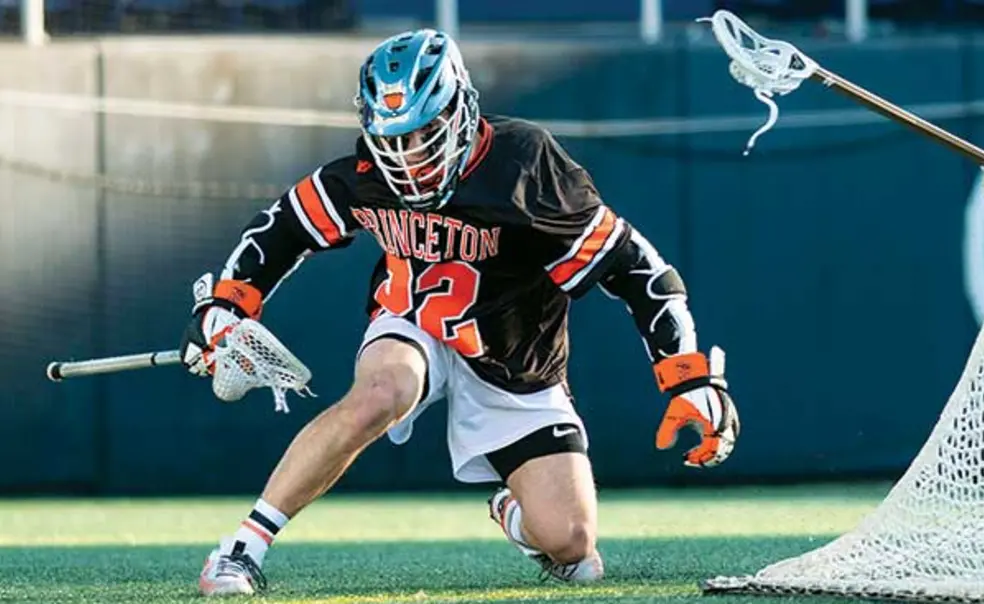Men’s Lacrosse: Michael Sowers ’20, Student of the Game
Attackman applies quickness, vision, and lessons gleaned from viewing video
Editor’s note: The following is an expanded version of a story from the March 18, 2020, issue, which went to print before the Ivy League’s cancellation of the remainder of the spring sports season.
Michael Sowers ’20 has watched thousands of hours of lacrosse in his life, much of it on video: footage of his teams and their opponents, broadcasts of games on his laptop, highlights of great players on YouTube. He watches as a student and as a fan, and he’s incorporated the best of what he’s seen into his game, which won him first-team All-American honors as an attackman in 2019 and a place as one of the elite players in Princeton’s history.
But Sowers prefers to “play with a free mind,” he said. “Lacrosse is more similar to basketball than it is to football. Strategy is a huge part of the game, but there’s a ton of gray area where you’re outside of your settled offense or defense and you have to make an adjustment. Being able to understand that gray area is crucial.”
Sowers holds Princeton’s all-time record for points scored — 302 through March 7, including 47 in the first five games this year, all Tiger wins — despite his modest size (5 feet, 9 inches and 175 pounds). Over his first three seasons, Sowers averaged 6.07 points per game — more than any Division I player since the early 1980s.
His dominance stems from his quickness, vision, and an ability to anticipate what other players will do. Dylan Gaines, a former starting defenseman for the University of Denver, said Sowers “was holding us hostage” in last year’s Denver-Princeton game, a 14–13 Tigers win in which Sowers had three goals and three assists. “The film doesn’t do justice to his ability to change direction. He’ll get you committed to going one way and then go to the other side,” said Gaines, who thinks Sowers is the best attackman in the country this year.
As a boy, Sowers said, he and his father Dave, a high school lacrosse coach, “would watch hours of film. I loved being with him and learning the game.” Michael also remembers playing “an old VHS tape” of Michael Powell, a great Syracuse attackman in the early 2000s who was “a joy to watch,” said Sowers, a history major. “My biggest takeaway from him was how much fun he had playing the game.”
Sowers’ athleticism allows him to imitate such figures. Growing up outside of Philadelphia, he watched eventual college stars Joey Sankey and Jordan Wolf “religiously,” he said, because they, like Sowers, were quick but undersized. Sowers recalls first seeing Sankey play “when he was a freshman in high school and probably 5-foot-3. I was the smallest kid in my class. Here was this little guy as tough as nails, not backing away from anyone. You never saw him pull up.”
“The film doesn’t do justice to his ability to change direction.”
— Dylan Gaines, former University of Denver defenseman
Sowers dodges with the same fearlessness, said former All-American attackman Jon Hess ’98. Instead of worrying about being hit by a defenseman, Sowers said, “I’m trying to read through my guy and see what the defense is trying to do on the play.” Most goals are the result of defensive errors, he added. As an attackman he’s trying to assess where the error is most likely to come from — and trying to cause it with his quickness.
The mistake can be modest, as it was on an assist from Sowers to Chris Brown ’21 last year against Rutgers. Emmet Cordrey ’19 set a pick for Sowers behind the goal, giving him a few more steps of distance from his defenseman as he ran toward the goal. Two Rutgers defenders froze as they watched Sowers, allowing Brown to cut to an opening, catch a pass from Sowers, and take a clear shot.
Sowers cites the feed as one of his favorite plays of the year even though Princeton lost the game. He explicated the five-second clip for 10 minutes and said that he and Princeton’s offense practiced the play for an hour each day in the week before the game. The Tigers saw the opportunity to get Brown that kind of shot when they reviewed an early-season loss to Virginia. “This play is the product of watching film and getting on the same page,” Sowers said.
He also continues to study other players. Sowers and Tom Schreiber ’14, a three-time first-team All-American midfielder, have struck up a friendship, and Sowers found much to learn from Schreiber’s play for his professional team, Archers L.C. of the Premier Lacrosse League. “I think he’s the best player in the world,” Sowers said. “He can see things before they happen. He can manipulate people with his eyes. He can pass from any spot on the field. Every game, I was watching.”












No responses yet